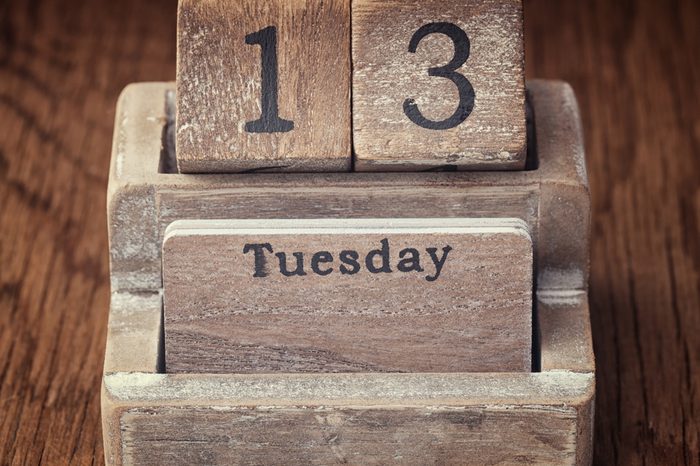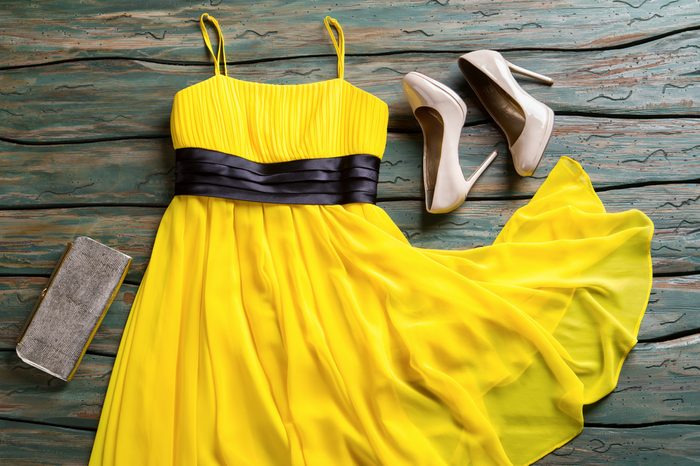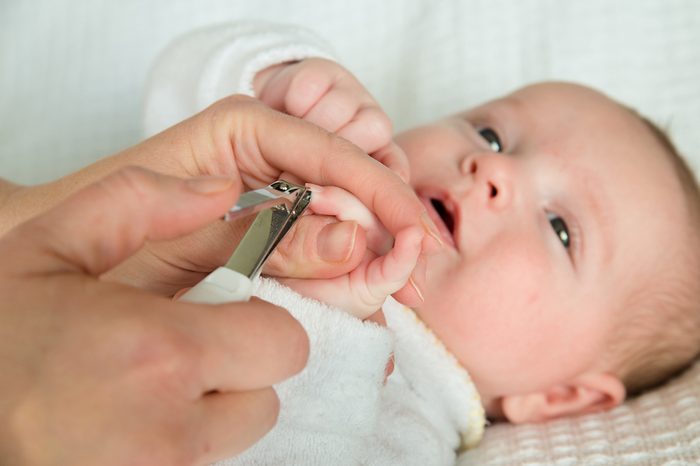Could calling a baby cute be a bad luck sign? According to one tradition, yes!

13 Surprising Things You Didn’t Know Were Considered Bad Luck


Carrying bananas on a ship
Sailors have always been a superstitious bunch. And bunches, in fact, were one of the things they considered to be bad luck on the high seas. In the 1700s, many ships that were lost or shipwrecked while traveling between Spain and the Caribbean happened to be carrying bananas, so having one on board came to mean bad news.
“One reason could be that bananas are naturally sweet and sticky, and they also release ethylene gas, which some believe … acts as a natural fish repellent,” explains Hubbard’s Marina, adding that in addition to discouraging fish, bananas were also blamed for mechanical issues and bad weather.

Wishing someone a happy birthday before their actual birthday
Want to make an entire weekend out of a birthday that falls on a Sunday? In that case, you might not want to celebrate in Germany, because many Germans believe that wishing someone a happy birthday before the day itself will cause misfortune to befall everyone involved. Instead, they follow a tradition called reinfeiern, where they get together the night before a birthday and begin celebrating when the clock strikes midnight. Saying “happy birthday” so much as a minute sooner is a major no-no.

Changing your bed on a Friday
According to an old wives’ tale, if you turn a mattress on a Friday, you’ll be cursed with bad dreams. A variation says that changing your bed on a Sunday is bad news too, so you might just want to avoid replacing your sheets on weekends altogether.

Renaming a boat
How could getting a new boat possibly be a bad luck sign?! Well, if you alter its existing name, you could be tempting fate. This legend dates back to ancient times, when sailors believed that the name of every single boat was written down in the immutable ledger of Poseidon. If you dared change the name of a boat, you’d incur the wrath of the sea god.
Boatmen who were determined to change their vessel’s name but also wanted to avoid bad luck performed elaborate rituals “designed to appease the sea gods,” states Captain’s Preferred Products. “These rituals often involved ceremonies conducted with great solemnity, including offerings to the sea and the recitation of prayers or incantations.”

Tuesday the 13th
Maybe Friday the 13th is a bad luck sign; maybe it’s just a matter of perspective. While Anglo-Saxon cultures see Friday the 13th as bad news, in Spain, the 13th day of the month is more unlucky when it falls on a Tuesday. In Spanish, the word for Tuesday is “Martes,” which comes from Mars, the Roman god of war, so Tuesday spells trouble. One thing both cultures can agree on, though, is that 13 is an unlucky number.

Mixing beers
The Czech Republic is the country that consumes the largest quantity of beer per capita, so it makes sense that there would be some unwritten rules and superstitions associated with having a brew. Supposedly, if you pour one type of beer into a mug already containing another type, you’re in for some misfortune.

Giving yellow clothes as a gift
Another Spanish superstition claims that recipients of saffron-colored garments will experience bad luck. According to Spanish legend, the sulfurous color of yellow is related to black magic or, for the more extremely superstitious, the devil himself. If you’re feeling superstitious, you can avoid wearing yellow, especially if you’re interviewing for a job, taking a test or doing something else for which good luck would be beneficial.

Complimenting a baby
In Serbia, if you say a baby is cute or sweet, you risk dooming the baby to a lifetime of bad luck. Confusingly, saying it’s ugly instead will keep it safe in the luck department. So in Serbia, there’s essentially no way for parents to tell if someone actually thinks their baby is funny looking or if they’re just trying to save it from misfortune.

Saying “Macbeth” in a theater
In an unusual twist, it’s the popularity of this Shakespeare tragedy that makes its name a sign of bad luck. Legend has it that in England, when a new play was a flop, the theater would end the run early and stage a production of Macbeth instead, since the popular show was a guaranteed hit. Therefore, saying “Macbeth” in the theater was equivalent to tempting fate and implying that the production might fail, a bit like saying “break a leg” instead of “good luck.” Even today, thespians dare not utter the name of the Scottish play within a theater’s walls.

Turning over a cooked fish
When eating fish in some regions of China—a meal often associated with good luck—it’s a bad luck sign to turn over your dinner. Flipping the fish is said to correspond to the motion of a boat capsizing. To avoid triggering such a disaster, many people in China reach the meat on the underside of the fish with chopsticks instead of turning it over.

Mixing wine and watermelon
Bad news for lovers of watermelon wine: According to Argentinian custom, you’re flirting with disaster by putting these two things together. Not only should you never let these two substances touch one another, but you shouldn’t even put them on the same table. This superstition has a few more and less stringent variations, though; some people avoid mixing watermelon with any type of alcohol, while others limit the restriction to just red wine and watermelon. This old wives’ tale warns that the two substances can be lethal together (or at the very least, cause a bad stomachache).

Pointing at a rainbow
In some cultures, including the Navajo tradition, people should not “point at a rainbow with your finger, or the rainbow will cut it off. Pointing at anything or anyone with the forefinger is considered to be taboo. It is seen as an aggressive action,” warns Navajo Code. Others consider rainbows to be celestial beings, or at the very least, sent by them. So you can ooh and aah at a rainbow all you like, but if you point at one, you’re disrespecting the deity responsible for it.

Cutting a young baby’s nails
According to an old-fashioned Welsh tradition, parents should never cut their baby’s nails before he or she reaches 6 months old. The superstition warns that if the baby has its nails cut in its first six months of life, he or she will grow up to have sticky fingers and become a thief. Instead, the mother is encouraged to “bite them off to keep them short,” states Oxford Reference.
Why trust us
At Reader’s Digest, we’re committed to producing high-quality content by writers with expertise and experience in their field in consultation with relevant, qualified experts. We rely on reputable primary sources, including government and professional organizations and academic institutions as well as our writers’ personal experiences where appropriate. We verify all facts and data, back them with credible sourcing and revisit them over time to ensure they remain accurate and up to date. Read more about our team, our contributors and our editorial policies.
Sources:
Hubbard’s Marina: “Bananas Bad Luck on a Boat?”
LearnOutLive: “7 Strange German Superstitions And Slightly Crazy Cultural Beliefs”
Soak & Sleep: “Fun Sleep facts, superstitions & sayings”
Captain’s Preferred Products: “Debunking the Myth: Is it Bad Luck to Rename a Boat?”
Mental Floss: “25 Bad Luck Superstitions from Around the World”
Oxford Reference: “Fingernails”
Navajo Code: “Navajo Superstitions”
Royal Shakespeare Company: “The Curse of the Scottish Play”
NPR: “The possible origins of Friday the 13th and other unlucky days”
The Local Spain: “Why Tuesday 13th is the day of bad luck in Spain”
The Holiday Property Bond: “What to avoid in Spain: 5 of the most common superstitions”
Scary Mommy: “Spilled Some Salt? Learn More About Common Superstitions And Their Origins”
Food Republic: “Why It’s Bad Etiquette To Flip Over A Whole Fish In China”




















